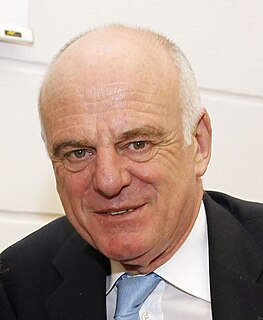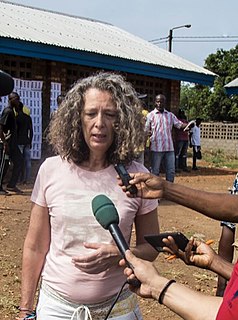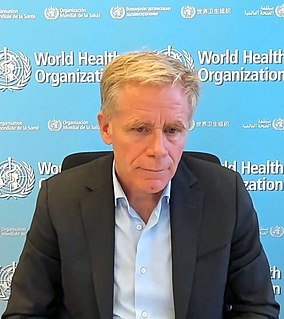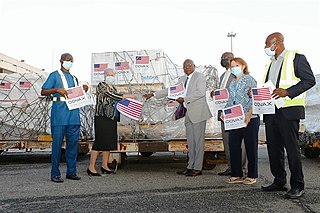
The World Food Programme (WFP) is the food-assistance branch of the United Nations. It is the world's largest humanitarian organization focused on hunger and food security, and the largest provider of school meals. Founded in 1961, it is headquartered in Rome and has offices in 80 countries. As of 2020, it served 115.5 million people in 80-plus countries, the largest since 2012.

The World Health Organization (WHO) is a specialized agency of the United Nations responsible for international public health. The WHO Constitution states its main objective as "the attainment by all peoples of the highest possible level of health". Headquartered in Geneva, Switzerland, it has six regional offices and 150 field offices worldwide.

David Muldrow Beasley is an American politician and the Executive Director of the United Nations World Food Programme. A member of the Republican Party, he served one term as the 113th Governor of South Carolina from 1995 until 1999 before losing reelection to Democrat Jim Hodges. He also served as a state representative from 1981 until 1995.

David Nabarro CBE is a Special Envoy on Covid-19 for the World Health Organization. He has made his career in the international civil service, working for either the Secretary-General of the United Nations or the Director-General of the World Health Organization. Since February 2020, he has helped the DGWHO deal with the COVID-19 pandemic.

Josette Sheeran is an American non-profit executive and diplomat who served in the United States Department of State. Sheeran serves as the seventh president and CEO of Asia Society since June 10, 2013. Sheeran was also the United Nations's Special Envoy for Haiti.

Tedros Adhanom Ghebreyesus is an Ethiopian public health researcher, and official who has been Director-General of the World Health Organization since 2017. Tedros is the first African in the role, and was endorsed by the African Union. He played a role in the response to both the Ebola virus epidemic and the COVID-19 pandemic.

Organizations from around the world responded to the West African Ebola virus epidemic. In July 2014, the World Health Organization (WHO) convened an emergency meeting with health ministers from eleven countries and announced collaboration on a strategy to co-ordinate technical support to combat the epidemic. In August, they declared the outbreak an international public health emergency and published a roadmap to guide and coordinate the international response to the outbreak, aiming to stop ongoing Ebola transmission worldwide within 6–9 months. In September, the United Nations Security Council declared the Ebola virus outbreak in the West Africa subregion a "threat to international peace and security" and unanimously adopted a resolution urging UN member states to provide more resources to fight the outbreak; the WHO stated that the cost for combating the epidemic will be a minimum of $1 billion.

Denise Brown is a Canadian senior official with the UN World Food Programme (WFP). She currently serves as Deputy Special Representative of the United Nations Multidimensional Integrated Mission in Central African Republic.
The following lists events that happened with or in collaboration with the United Nations and its agencies in the year 2019.
The following lists events that happened with or in collaboration with the United Nations and its agencies in the year 2020.

Bruce Aylward is a Canadian physician and epidemiologist. Since September 2017, Aylward has been Senior Advisor to the Director-General of the World Health Organization. He is part of the implementation of the WHO's COVAX Facility. He has past experience in the areas of polio eradication, Zika virus, and Ebola.
COVID-19 Solidarity Response Fund is a global fund for supporting the work of the World Health Organization (WHO) in containing the COVID-19 pandemic. It was launched on 13 March 2020 by the United Nations Foundation and the Swiss Philanthropy Foundation in support of WHO, and was announced by the Director-General of WHO in Geneva, Switzerland. The purpose of the response fund is to "support WHO’s work, including with partners, to track and understand the spread of the virus; to ensure patients get the care they need and frontline workers get essential supplies and information; and to accelerate research and development of a vaccine and treatments for all who need them." Major companies, including Facebook, H&M, and Google have donated to the Solidarity Response Fund, in addition to several hundred thousand private individuals.

This article documents the chronology of the response to the COVID-19 pandemic in April 2020, which originated in Wuhan, China in December 2019. Some developments may become known or fully understood only in retrospect. Reporting on this pandemic began in December 2019.

The World Health Organization (WHO) is a leading organization involved in the global coordination for mitigating the COVID-19 pandemic, within the broader United Nations response to the pandemic.

The director-general of the World Health Organization (WHO) is the chief executive officer of WHO and the principal advisor to the United Nations on matters pertaining global health. The director general is elected by and answers to the World Health Assembly (WHA). The current director-general is Tedros Adhanom Ghebreyesus, who was appointed on 1 July 2017, and re-appointed on 24 May 2022. The Director-General also leads the WHO Secretariat and is also the ex-officio Secretary of the World Health Assembly, the WHO Executive Board, and of all commissions and committees, and conferences convened by the Organization.
Science diplomacy is the collaborative efforts by local and global entities to solve global issues using science and technology as a base. In science diplomacy, collaboration takes place to advance science but science can also be used to facilitate diplomatic relations. This allows even conflicting nations to come together through science to find solutions to global issues. Global organizations, researchers, public health officials, countries, government officials, and clinicians have previously worked together to create effective measures of infection control and subsequent treatment. They continue to do so through sharing of resources, research data, ideas, and by putting into effect laws and regulations that can further advance scientific research. Without the collaborative efforts of such entities, the world would not have the vaccines and treatments we now possess for diseases that were once considered deadly such as tuberculosis, tetanus, polio, influenza, etc. Historically, science diplomacy has proved successful in diseases such as SARS, Ebola, Zika and continues to be relevant during the COVID-19 pandemic today.

The United Nations response to the COVID-19 pandemic has been led by its Secretary-General and can be divided into formal resolutions at the General Assembly and at the Security Council (UNSC), and operations via its specialized agencies and chiefly the World Health Organization in the initial stages, but involving more humanitarian-oriented agencies as the humanitarian impact became clearer, and then economic organizations, like the United Nations Conference on Trade and Development, the International Labour Organization, and the World Bank, as the socioeconomic implications worsened.

Vaccine diplomacy, a form of medical diplomacy, is the use of vaccines to improve a country's diplomatic relationship and influence of other countries. Meanwhile, vaccine diplomacy also "means a set of diplomatic measures taken to ensure access to the best practices in the development of potential vaccines, to enhance bilateral and/or multilateral cooperation between countries in conducting joint R&D, and, in the case of the announcement of production, to ensure the signing of a contract for the purchase of the vaccine at the shortest term." Although primary discussed in the context of the supply of COVID-19 vaccines, it also played a part in the distribution of the smallpox vaccine.

This article documents the chronology of the response to the COVID-19 pandemic in September 2020, which originated in Wuhan, China in December 2019. Some developments may become known or fully understood only in retrospect. Reporting on this pandemic began in December 2019.

COVID-19 Vaccines Global Access, abbreviated as COVAX, is a worldwide initiative aimed at equitable access to COVID-19 vaccines directed by the GAVI vaccine alliance, the Coalition for Epidemic Preparedness Innovations (CEPI), and the World Health Organization (WHO), alongside key delivery partner UNICEF. It is one of the four pillars of the Access to COVID-19 Tools Accelerator, an initiative begun in April 2020 by the WHO, the European Commission, and the government of France as a response to the COVID-19 pandemic. COVAX coordinates international resources to enable low-to-middle-income countries equitable access to COVID-19 tests, therapies, and vaccines. UNICEF is the key delivery partner, leveraging its experience as the largest single vaccine buyer in the world and working on the procurement of COVID-19 vaccine doses, as well logistics, country readiness and in-country delivery.











